DOE Grant Project
- Home
- DOE Grant Project
Expanding the Solar Workforce through the Illinois Community College System
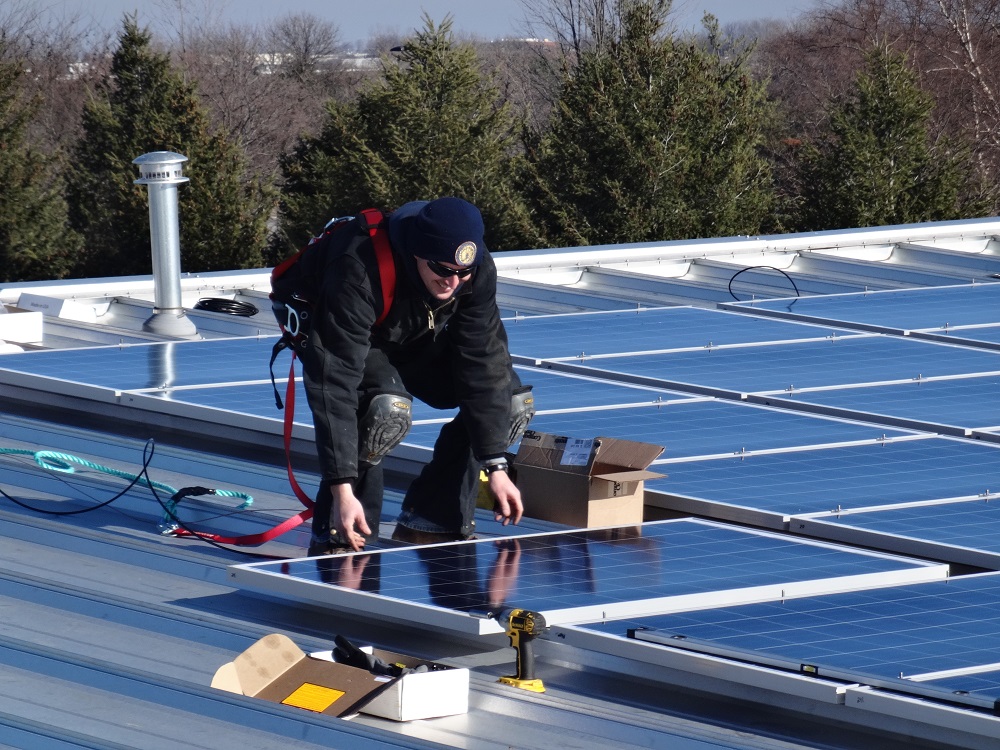 In 2020, IGEN received a $1.25M, three-year grant from the U.S. Department of Energy to create and sustain a comprehensive, statewide strategy that equips education and training providers, workers, businesses, and communities with resources and tools to prepare a solar workforce. Five Illinois community colleges participated in the grant initiative: City Colleges of Chicago, John A. Logan College, Kankakee Community College, Lewis and Clark Community College, and Lincoln Land Community College. Additionally, three industry partners served as an advisory group to the initiative providing data and guidance on needed skills for the solar workforce and to ensure curricula was accessible and industry-driven: Elevate Energy, Midwest Renewable Energy Association, and StraightUp Solar.
In 2020, IGEN received a $1.25M, three-year grant from the U.S. Department of Energy to create and sustain a comprehensive, statewide strategy that equips education and training providers, workers, businesses, and communities with resources and tools to prepare a solar workforce. Five Illinois community colleges participated in the grant initiative: City Colleges of Chicago, John A. Logan College, Kankakee Community College, Lewis and Clark Community College, and Lincoln Land Community College. Additionally, three industry partners served as an advisory group to the initiative providing data and guidance on needed skills for the solar workforce and to ensure curricula was accessible and industry-driven: Elevate Energy, Midwest Renewable Energy Association, and StraightUp Solar.
Expected Outcomes
- 180 students will enroll in solar education or training programs targeted for improvement at participating Illinois community colleges.
- Create, expand or update 20 courses, certificates/degrees, and/or training programs.
- Engage with business partners at least 35 times across the grant period.
- Using targeted outreach and recruiting initiatives, at least 18 students enrolled in solar education or training programs at participating Illinois community colleges will be veterans.
- Share curriculum with at least two other Illinois colleges in the IGEN network.
- Within three months of completion, 95-97 students attain employment in the solar field.
Results
The participating colleges exceeded their goals for enrollment of students, the number of courses created or updated, and the number of business engagements. The project also met its goals of sharing best practices and curriculum created through the program with other partner colleges. More importantly, all the participating colleges have committed to sustaining their solar training program.
- 422 students enrolled in solar education or training programs targeted for improvement at participating Illinois community colleges.
- 55 courses were created, expanded or updated, certificates/degrees, and/or training programs.
- 45 business partners were engaged across the grant period.
- Curriculum was shared with all 5 participating colleges and 3 additional Illinois Community Colleges in the IGEN network.
- 28 completers were employed/placed as fulltime or intern employees within three months of completion, in the solar field.
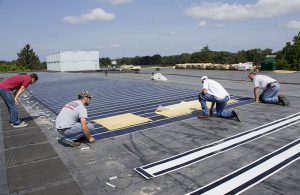
Lewis and Clark Community College (LC) was a subrecipient of IGEN’s Department of Energy Grant “Expanding the Solar Workforce.” Over the course of the grant, LC offered training to 50+ students. To support the diversification of the trained workforce, 42 percent of the students trained were students of color and 12 percent were veterans. Of those that completed the training, 21 gained employment in the solar industry, and three started their own solar company.
LC would not have achieved success without the DOE funding. This funding helped the college improve and expand its solar offerings in several ways. First the college hired a new instructor, Kyle Barber, who was highly recommended by local solar experts and who had experience running a solar training program at Illinois Central College. Kyle updated and improved the curricular offerings for Solar 120 Solar Design and Installation and Solar 121 Grid Tied Solar Design. Students participated in mock solar panel installations utilizing commercial and residential roof models funded by the grant.
DOE funds were utilized to purchase solar panels, racking, an inverter, and site assessment drones. Grant funding also helped improve marketing and outreach efforts which led to a new partnership with Macedonia Development Corporation (MDC). Utilizing DOE funding, LC worked in partnership with MDC to set up a hybrid classroom in East St. Louis training students about careers in solar industries.
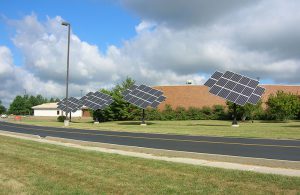
Kankakee Community College (KCC) updated curriculum and purchased the requisite equipment utilizing IGEN-DOE grant funds. The Introduction to Solar PV Technology course prepares learners for the NABCEP Associate Credential. Students can then gain more specialized and advanced solar technician skills through the Advanced PV Design and Installation and Solar Operations and Maintenance courses. The college utilized grant funds to purchase new equipment, additional labs, and update curriculum to be more tailored to the current employment market.
Two new credit courses were created with grant funds. Advanced PV Installation and Solar Operations and Maintenance courses offer students more advanced offerings if they want to specialize in solar and earn a certificate in Solar PV technology. The college also hosted two non-credit field-building courses for solar professionals and solar instructors. These courses focused on advanced topics in solar related to maintenance and solar storage.
To increase recruitment in their solar courses, KCC adopted a strategy to recruit students from aligned programs, such as electrical engineering. They focused recruitment efforts on students who may not have declared a specialty/major or those looking to develop a wider range of skills. Additionally, KCC worked with business partners to recruit incumbent workers and with their veteran’s office to boost recruiting efforts among veterans.
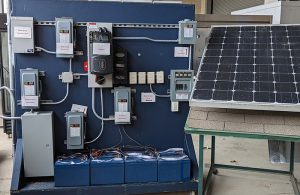
Utilizing grant funds, Lincoln Land Community College (LLCC) developed two, six hour workshops to prepare learners for entry level positions in the solar field. These courses were updated to meet the needs of students and local industry by renovating and expanding our solar training stations. Grant funds were used to purchase new batteries, helping to show not only the abundant energy provided by the sun but to also store the energy for use anytime. In addition, the trainer was rewired and made safer by the purchase of new combiner boxes. This station is an excellent resource to demonstrate and explain the process of solar power and a great tool to excite students to learn about green energy, both during lab time as well as for open houses and recruiting events.
LLCC also partnered with the Midwest Renewable Energy Association (MREA) to develop a short-term training program designed to help learners prepare for the North American Board of Certified Energy Practitioners (NABCEP) Associate Certificate.
To recruit participants, LLCC worked with the college’s marketing department, community partners, current students, and instructors to recruit students. The college published press releases and social media posts advertising the program. Additionally, LLCC reached out to local high schools to promote the program to seniors and to chambers of commerce to recruit incumbent workers from local businesses.
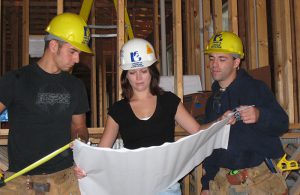
Utilizing funds from the IGEN Department of Energy grant, John A Logan College (JALC) developed a four-part series of noncredit, community education courses called Solar Knowledge for Beginners. Taken in total, the series prepares learners for the North American Board of Certified Energy Practitioners (NABCEP) Associate Certificate and OSHA 10.
JALC also utilized grant funds to develop a hands-on solar installation internship opportunity for students in their construction management, HVAC/R, and electronics technology program to augment their education. The College’s construction and HVAC students were given the opportunity to install solar on local Habitat for Humanity homes. This experience allowed the students a real-life, hands-on opportunity to practice solar installation. The students through the donation of their time, helped local families access solar and realize lower utility costs.
JALC advertised the Solar Knowledge for Beginners series in the college’s community education brochure which is widely distributed in the college’s service area. Additionally, the college’s construction and HVAC/R instructors assisted with recruitment efforts for the solar installation internship, raising awareness of the program among their students.
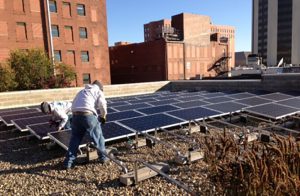
In the college’s Environmental Technology Career Pathway, City Colleges of Chicago (CCC) offers an elective, credit course titled Renewable Energy This course, offered on the Wilbur Wright Campus, prepares learners for the North American Board of Certified Energy Practitioners (NABCEP) Associate Certificate. IGEN Department of Energy grant funds were utilized to procure new technical supplies and provide learners with tuition assistance.
CCC partners with Elevate, a community-based organization. Working with CCC and industry partners, Elevate developed curriculum for a 16-week community-based training, “Future Energy Jobs Act Solar Jobs Training Program.” This program includes stackable, industry-recognized credentials. CCC supported curriculum development utilizing grant funds to embed solar PV installation and OSHA 30. The Elevate program serves as a recruitment pathway into CCC’s degree programs.
By partnering with Elevate, CCC was able to increase their recruitment of target populations including women, low-income students, and students of color.
